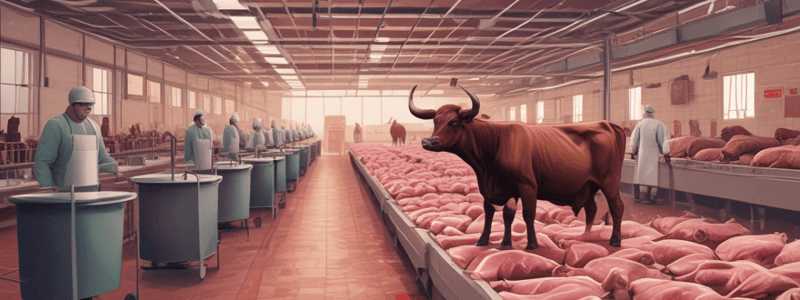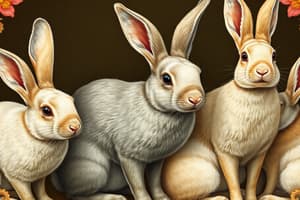Podcast
Questions and Answers
What percentage of muscular tissue is made up of protein?
What percentage of muscular tissue is made up of protein?
- 40%
- 10%
- 30%
- 20% (correct)
Higher heat tenderizes protein after it has coagulated.
Higher heat tenderizes protein after it has coagulated.
False (B)
What is the purpose of barding?
What is the purpose of barding?
The addition of surface fats where they are absent.
Marbling is fat that has been accumulated into _______________ tissue.
Marbling is fat that has been accumulated into _______________ tissue.
Match the benefits of fat in meat with their descriptions:
Match the benefits of fat in meat with their descriptions:
What is the approximate percentage of muscular tissue made up of fat?
What is the approximate percentage of muscular tissue made up of fat?
What is the Maillard reaction?
What is the Maillard reaction?
Meat has a high carbohydrate content.
Meat has a high carbohydrate content.
What is the approximate percentage of water in muscular tissue?
What is the approximate percentage of water in muscular tissue?
Mutton is a type of wild game meat.
Mutton is a type of wild game meat.
What is meat primarily made up of?
What is meat primarily made up of?
Meat is made up of muscle tissue from domestic animals, such as ______________.
Meat is made up of muscle tissue from domestic animals, such as ______________.
Which of the following is NOT a component of muscle tissue?
Which of the following is NOT a component of muscle tissue?
All meats are soft and tender.
All meats are soft and tender.
Match the following types of meat with their order of discussion:
Match the following types of meat with their order of discussion:
Why is it important to understand the composition and structure of meat?
Why is it important to understand the composition and structure of meat?
What is the reason for the unavailability of beef in India?
What is the reason for the unavailability of beef in India?
Quality grades of meat are a concept in India.
Quality grades of meat are a concept in India.
What is the difference between intensively raised pork and pork raised in the open air?
What is the difference between intensively raised pork and pork raised in the open air?
Pigs were historically bred in _______________________ and given waste food.
Pigs were historically bred in _______________________ and given waste food.
Match the following meat production systems with their characteristics:
Match the following meat production systems with their characteristics:
What is the primary flaw in intensively raised pork?
What is the primary flaw in intensively raised pork?
All countries allow the use of growth hormones in feed.
All countries allow the use of growth hormones in feed.
What is the alternative to beef used in India?
What is the alternative to beef used in India?
Flashcards are hidden until you start studying
Study Notes
Types of Meat
- Buffalo meat is used in India due to cultural and religious sensitivity towards beef
- Buffalo meat can be raised intensively or organically, with quality grades not being a concept in India
- Buying buffalo meat from a trusted supplier is crucial
- Flavor pairings for buffalo meat include cream, chilli, garlic, mushrooms, and more
- Classic recipes featuring buffalo meat include Châteaubriand, ragù alla bolognese, and buffalo Wellington
Pork
- Pigs are one of the first domesticated animals, now mostly raised in industrial units on a grain- and soya-based diet
- Medication practices vary worldwide, with some countries and organic systems prohibiting antibiotics for prophylactic purposes
- The technique of upbringing, diet, and pig breed affect the flavor and texture of the meat produced
- Intensively raised pork is pale and lean, while pork raised in the open air offers darker, tougher flesh with a more pronounced flavor
Protein
- Protein is a vital nutrient, making up approximately 20% of muscular tissue
- Protein coagulates when heated, becoming stiffer and losing moisture, related to doneness
- Higher heat toughens protein after coagulation
Fat
- Fat makes up approximately 5% of muscular tissue, with some meats being bred and raised with reduced fat content
- Fat is beneficial for juiciness, tenderness, and flavor
- Marbling is fat accumulated in muscle tissue, typically found in buffalo
- Surface fat keeps meat from drying out during cooking and storage, with barding being the addition of surface fats where they are absent
Carbohydrate
- Meat has a low carbohydrate content, with negligible nutritional value due to its small quantity
- Carbohydrates are significant for the Maillard reaction, a complex reaction occurring when meats are browned through roasting, broiling, or sautéing
Meat Composition
- Meat is made up of muscle tissue from domestic animals (cattle, hogs, lambs) and wild game animals (deer)
- Meat composition consists of three major components: water (approximately 75% of muscular tissue), protein, and fat
Studying That Suits You
Use AI to generate personalized quizzes and flashcards to suit your learning preferences.




